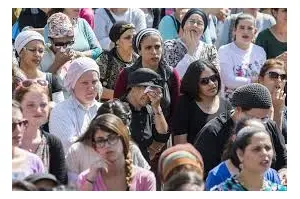Freed Israeli Describes Harrowing Experience in Attack and Surprising Treatment in Gaza
Israeli octogenarian, Yocheved Lifshitz, recounts her abduction by Hamas militants near the Gaza Strip. Despite the initial violence, Lifshitz expresses surprise at her captors' relatively humane treatment during her two-week captivity. She describes them as courteous and well-prepared, providing necessary supplies and regular medical check-ups. Lifshitz's story sheds light on the complex human experiences amid conflict.
Yocheved Lifshitz's Abduction by Hamas: A Remarkable Account of Captivity

A 85-year-old Israeli woman, Yocheved Lifshitz, who had been abducted by the Palestinian militant group Hamas, shared her harrowing experience of captivity. She described it as a nightmarish ordeal, recounting the moment she was kidnapped from her Nir Oz kibbutz near the Gaza Strip. Despite the initial violence during her abduction, Lifshitz surprisingly found that her captors treated her and the other captives relatively well. She revealed that they received visits from a doctor every two to three days and were provided with necessary medications. When asked why she reached out to shake the hand of a militant upon her release, Lifshitz explained that she found her captors to be surprisingly gentle and courteous, even though the circumstances were far from ideal.

She went on to describe her captors as "very friendly" and well-prepared for the situation, having stocked up on essential supplies, including shampoo. The captives were even provided with food, although their meals were modest, consisting of pitas with cream cheese, melted cheese, and cucumbers.
“I went through hell, I didn’t think or know I’d get to this situation. They went on a rampage in our kibbutz, kidnapped me, lay me over a motorcycle… and sped off with me through the ploughed fields,” she said a day after her release. “The guys beat me on the way, they didn’t break my ribs but hurt me there very much,” Lifshitz said.
“They treated us well,” she told reporters at a Tel Aviv hospital, explaining a doctor visited her and fellow hostages every two to three days and provided medicines.
Her husband, also in his 80s, is among more than 200 hostages still being held in Gaza.
“They treated us gently, and provided all our needs,” she said, when asked why she reached out to shake the hand of a militant the moment she was freed.
Lifshitz described her captors as “very friendly” and “very courteous” people who held her with four other captives.
“They seemed ready for this, they prepared for a long time, they had everything that men and women needed, including shampoo,” she told journalists.
“We ate the same food they did — pitas with cream cheese, melted cheese, cucumbers. That was a meal for an entire day,” said Lifshitz.
Lifshitz and another resident, Nurit Cooper, were fortunate enough to be released after three days in captivity. Unfortunately, more than 200 hostages, including Lifshitz's husband, are still held in Gaza.



